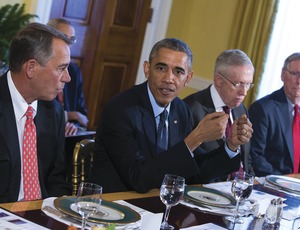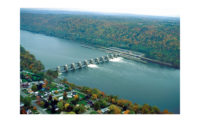
As construction-industry officials look ahead to a Republican-controlled 114th Congress in January, they are focusing on several bills they would like to see lawmakers pass in the lame-duck session that began on Nov. 12.
The measures include an appropriations package to fund federal agencies, including construction programs, past mid-December; extensions for expiring multi-employer pension and terrorism insurance programs, and federal contracting changes contained in a defense bill.
The tone of the lame-duck debates on these bills also may signal whether the new Congress will demonstrate more bipartisanship or return to gridlock.
Many agree a must-pass item would be a new spending bill to succeed a stopgap that expires on Dec. 11. House and Senate appropriations-committee staffs have been busy during the congressional recess, drafting a government-wide omnibus measure. "We are making great progress on all fronts," a Senate appropriations Democratic aide said via email. The staffer says negotiators are "moving close to a place where we think we can get a bipartisan omnibus approved early in December." The bill will extend further into fiscal 2015 and maybe to Sept. 30.
Cathy Connor, Parsons Brinckerhoff senior vice president, says, "Senate Republicans, at least, have definitely said that they want to get the appropriations issue off the table during the lame duck so that they can start calendar year 2015 with a clean slate and just start focusing in on their priorities."
Construction officials also want Congress to modify the federal program that supports multi-employer pension plans. At a minimum, they seek an extension of 2006 Pension Protection Act provisions, which expire on Dec. 31. Multi-employer plans are common in construction's unionized sector.
Also lapsing on that date is the Terrorism Risk Insurance Act (TRIA), which provides a federal backstop for private insurance coverage from catastrophic terrorism-related acts. An industry coalition that includes construction and real estate groups favors a multi-year TRIA extension, the third since the program was established in 2002. The Senate has passed a new seven-year bill; a House committee cleared a differing bill.
Some in industry back provisions in a House-passed defense bill that require two-step procurements for many design-build contracts and aim to combat individual-sureties fraud. The language is not in a Senate committee-passed version.
There also is industry support for retroactively extending tax incentives that expired on Dec. 31, 2013, including breaks for renewable energy and accelerated depreciation of capital assets.
Steve Hall, American Council of Engineering Companies vice president for government affairs, says, "The big question is, how much do [Republicans] really want to try to get done of substance during the lame duck, knowing they have a pretty strong majority in 2015."
The GOP, indeed, won big on Nov. 4, scoring 52 Senate seats to the Democrats' 46, with two races not yet decided. While several House races remain undecided, Republicans added at least 11 seats in that chamber, boosting their total to 244.
But the GOP's new Capitol Hill power isn't absolute. If Republicans push legislation that riles Democrats, the GOP lacks the 60 Senate votes needed to block a filibuster. The party is also well short of the twos-thirds majorities needed in each chamber to override a presidential veto.
After the election, incoming Senate Majority Leader Mitch McConnell (R-Ky.) said he saw room for bipartisanship, observing, "Just because we have a two-party system doesn't mean we have to be in perpetual conflict." President Obama said public works might be common ground. On Nov. 5, Obama said, "Traditionally, both parties have been for creating jobs rebuilding our infrastructure—our roads, bridges, ports, waterways." He added, "I think we can [home] in on a way to pay for it through tax reform that closes loopholes and make it more attractive for companies to create jobs here in the United States."
Construction officials hope that enough bipartisanship will surface in the new Congress to spark a multi-year highway-transit bill. But a Hill consensus hasn't emerged on Obama's tax-reform idea or other sources for the tens of billions of new dollars needed to fund that measure.



Post a comment to this article
Report Abusive Comment